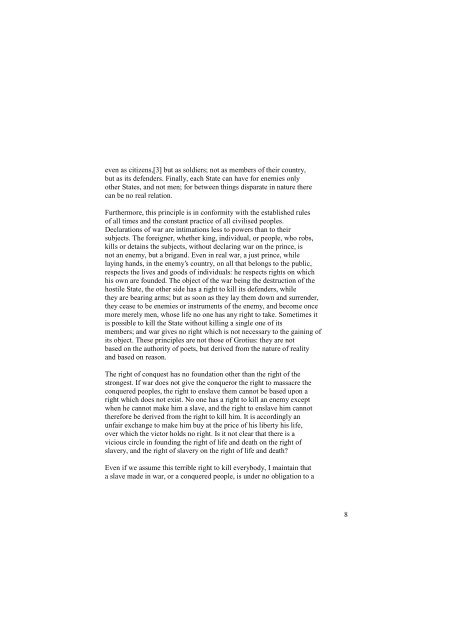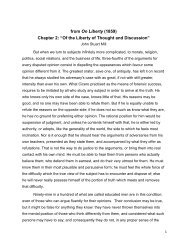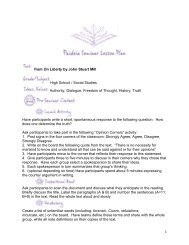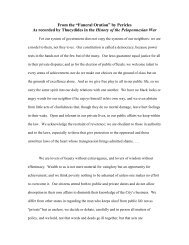Rousseau_contrat-social
You also want an ePaper? Increase the reach of your titles
YUMPU automatically turns print PDFs into web optimized ePapers that Google loves.
even as citizens,[3] but as soldiers; not as members of their country,<br />
but as its defenders. Finally, each State can have for enemies only<br />
other States, and not men; for between things disparate in nature there<br />
can be no real relation.<br />
Furthermore, this principle is in conformity with the established rules<br />
of all times and the constant practice of all civilised peoples.<br />
Declarations of war are intimations less to powers than to their<br />
subjects. The foreigner, whether king, individual, or people, who robs,<br />
kills or detains the subjects, without declaring war on the prince, is<br />
not an enemy, but a brigand. Even in real war, a just prince, while<br />
laying hands, in the enemy’s country, on all that belongs to the public,<br />
respects the lives and goods of individuals: he respects rights on which<br />
his own are founded. The object of the war being the destruction of the<br />
hostile State, the other side has a right to kill its defenders, while<br />
they are bearing arms; but as soon as they lay them down and surrender,<br />
they cease to be enemies or instruments of the enemy, and become once<br />
more merely men, whose life no one has any right to take. Sometimes it<br />
is possible to kill the State without killing a single one of its<br />
members; and war gives no right which is not necessary to the gaining of<br />
its object. These principles are not those of Grotius: they are not<br />
based on the authority of poets, but derived from the nature of reality<br />
and based on reason.<br />
The right of conquest has no foundation other than the right of the<br />
strongest. If war does not give the conqueror the right to massacre the<br />
conquered peoples, the right to enslave them cannot be based upon a<br />
right which does not exist. No one has a right to kill an enemy except<br />
when he cannot make him a slave, and the right to enslave him cannot<br />
therefore be derived from the right to kill him. It is accordingly an<br />
unfair exchange to make him buy at the price of his liberty his life,<br />
over which the victor holds no right. Is it not clear that there is a<br />
vicious circle in founding the right of life and death on the right of<br />
slavery, and the right of slavery on the right of life and death?<br />
Even if we assume this terrible right to kill everybody, I maintain that<br />
a slave made in war, or a conquered people, is under no obligation to a<br />
8











